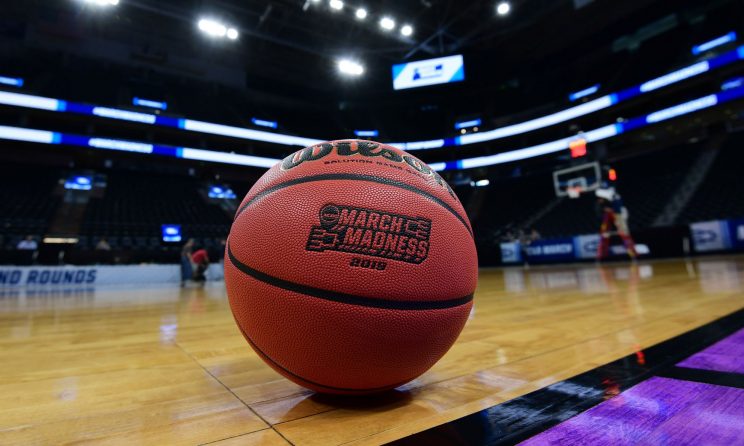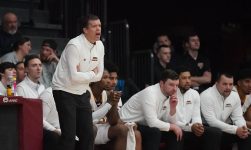
College basketball is scheduled to start its season on Wednesday. If, that is, there are any remaining teams, healthy coaches or programs still up and running.
That’s a slight exaggeration, of course. Duke, Arizona and Tennessee all lost games on Monday. The A-list of coaches sidelined with COVID-19 includes Syracuse’s Jim Boeheim, Baylor’s Scott Drew and Tennessee’s Rick Barnes. Michigan State’s Tom Izzo just returned. There will be more, especially with an indoor contact sport happening during flu season.
“It’s going to be a nightmare,” Iona coach Rick Pitino told Yahoo Sports. “They’re just trying to rush it to get to March, and it’s not worth risking everyone’s health.”
A bleak spree of breaking news the past 72 hours leaves the sport at a crossroads. College basketball is crumbling in front of us because of greed, competing agendas and a lack of leadership. By foolishly deciding to play non-conference games, the sport is now risking what it really needs in the long term – a way to play conference games and, most importantly, play the NCAA tournament.
After seeing all of the issues that have beset college football and reading the accurate medical predictions for how the virus will spike precipitously in November, college basketball leaders made a slight adjustment. They pushed the season back from Nov. 10 to start this week. The hope was that students leaving campus would allow an environment to let teams play with low risk. That’s backfired spectacularly. It’s trending to the point where it’ll be a surprise when a game is actually played, as we’ve become numb to the wave of cancellations.
There are more than 40 programs of the 357 in Division I that are either on pause or not playing this season. Those on pause include teams from Florida to Creighton and Syracuse to Denver. No level or geographic area has been spared issues.
The virus has spiked so precipitously around the country that it’s beginning to look negligent to send teams criss-crossing the country – many flying commercial – against the recent recommendations of the Centers For Disease Control. “At this point, I’m not sure why we’re trying,” said a major conference official. “I wonder if in like 10 to 14 days it will be shut down.”
Story continues
The college basketball season begins on Wednesday despite all of the various risks facing the sport during the COVID-19 pandemic. (Kirby Lee-USA TODAY Sports)
The core issue with college basketball is that these non-conference games aren’t worth the risk. Sure, they fill many programming hours, mandatory contract inventory and make programs a bit money. And we’d all love the distraction of college basketball to fill these quiet nights amid the pandemic. But the potential of issues in college basketball’s early season are risking what really matters in the long term – the viability of the conference season and the NCAA tournament.
The only goal of this college basketball season should be to play the NCAA tournament in some form. Forget metrics, data points and selection process. This isn’t about KenPom or any of the other alphabet soup of metrics used to determine who reaches the tournament every year. There’s been a laughable amount of energy expended on how they’ll determine who will get in the 2021 NCAA tournament and not nearly enough on how they’ll actually play the 2021 NCAA tournament.
If you are going to play a season in a pandemic without the luxury of the NBA’s $100 million-plus bubble, find the simplest and safest way to execute it. Pare down the schedules. Streamline to conference only, and put some thought and money into bubbling — or quasi-bubbling — those scenarios.
Will this hurt leagues like the WCC, Mountain West and Atlantic-10 that rely on non-league games to make the NCAA notice? Absolutely. But who cares? A flawed NCAA tournament is better than this regrettable attempt at a regular season that could endanger having an NCAA tournament. Take a five-year average of a league as a guide, use the eye test and pick 68. This isn’t about giving Belmont a chance, it’s about securing a future for the sport.
Why are teams flying to South Dakota for something called the Bad Boy Mowers Crossover Classic? In South Dakota, mask wearing is a roiling political topic and the virus is so bad that the positivity rate is nearly 60%. Only three of the remaining eight teams scheduled to play are actually playing in the tournament. Which begs asking why there still is a tournament.
“Us playing non-conference games is going to prevent us from playing conference games,” said a Power Five head coach. “Why can’t we figure this out?”
The ambition of exempt tournament organizers and the demands of TV money have clouded the judgment of the sport’s leaders. The world can live without the Bad Boy Mowers Classic. Wipe the schedule clean for at least a month – probably two – and dial in on the safest ways to play conference games. Worry more about execution than quantity. Worry more about safety than inventory.
“They see the virus spreading like wildfire, countries are shutting down and we’re trying to open up while it’s spreading,” Pitino said. “It’s going to be another season where we’re not going to play [the postseason]. It’s going to be a disaster.”
There’s too much at stake to not do everything possible to play the NCAA tournament, as the NCAA is in the financial fetal position after last year’s tournament got canceled and the organization lost hundreds of millions in television revenue.
“The future of the entire association depends on it,” VCU athletic director Ed McLaughlin said. “That’s the bigger thing. It’s the entire association and all of college sports.”
Yahoo Sports called around on Sunday and Monday and found an intriguing dichotomy. Many coaches were like Pitino, waving their arms and saying it’s crazy to play. Others were ready to plow ahead, embrace disruption and get in as many games as possible. They’ve seen football deal with disruption, and they’re comfortable doing the same. “It’s that electoral college map,” said an industry source. “That’ll show you where the concern is and where it isn’t.”
The NCAA needs to show traits that it has long lacked – creativity and nimbleness. They’ve made progress by announcing that the tournament will be held at one site this year. NCAA senior vice president of basketball Dan Gavitt is among the most respected people at NCAA headquarters. But it’s not going to be his unilateral decision, as the NCAA Division I Council would have to get together to pause, delay or cancel the non-conference season. So far, there’s little traction there.
The entire sport needs to be open to scrapping the non-conference, bubbling conference games and figuring out a way to play. If that means a tournament that’s in March or May – when a vaccine could be more widespread – then they need to be open to that possibility.
“We’re running into what we knew we were going to run into with the virus,” McLaughlin said. “It’s all happening as we knew it would.”
A quick pivot away from non-league play needs to begin soon. An openness to moving the NCAA tournament needs to emerge. The future of the sport is at stake, and college basketball is operating with a hapless strategy of hope.
More from Yahoo Sports:






